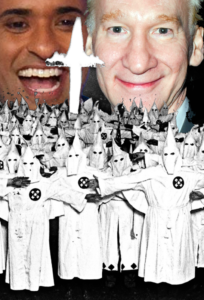Nothing KKKompares to the KKK
Audio version: To listen in a player, use the one below or click here. To download the mp3, right-click here and choose “save link as” or “save target as.”
The “just-world fallacy” is the childishly simplistic moral fantasy that the world is like a stupid Hollywood movie: an unerringly fair place where the good guys win, the bad guys lose, and everyone gets exactly what they deserve in the end.
It’s widely understood that the winners write history, but what’s less often grasped — or even discussed — is that one of victory’s prime spoils is the right to dictate who’s good and who’s bad.
The Ku Klux Klan — you may have heard of them — was founded on Christmas Eve in 1865 in Pulaski, Tennessee by a half-dozen former Confederate officers eight months after the Confederacy surrendered to Union troops at Appomattox, Virginia.
Ever since then, the KKK has had a really rough time in the court of public opinion. It’s like they just can’t catch a break.
In the current moral framework, it’s a VERY VERY VERY BAD thing to be compared to the KKK. Whenever anyone likens an individual or a group to the Klan, it’s rarely taken as a compliment. Even more rarely, if ever, is it given as a compliment.
Just like the Nazis — who, I feel the need to remind you, lost their war in 1945 — are still depicted as an ever-present threat several generations after being outgunned in a conflict that was solved through brute force and deception, just as all conflicts ultimately are, the Klan, despite not existing in any meaningful sense, is still seen as the two-dimensional embodiment of pure EEEEEE-vil. There are simply no shades of grey when it comes to the KKK. To demonstrate this, I will now become the first person in world history to use “nuance” and “KKK” in the same sentence.
Since there’s much less risk in comparing someone or something to the KKK than there is in being compared to them, one is never at a loss when searching for Klan comparisons.
Just as you’re forbidden to ever suggest that Jews may behave like Nazis, it’s also gauche to imply that non-whites can ever act like the Klan. It gets even more confusing when non-whites compare other non-whites to the Klan.
Republican presidential candidate Vivek Ramaswamy has a name that assures you his ancestors were not on the Mayflower. It seems as if he’s being buttered up like a little brown cinnamon roll to shield Republicans from predictable, and tiresomely damaging, accusations of “racism.” He recently caught some flak for an August 27 tweet where he likened two black public figures to the KKK:
“The remedy to past discrimination is present discrimination.” — Ibram Kendi
“We don’t want any more brown faces that don’t want to be a brown voice.” — Ayanna Pressley
It’s racist. It’d make the Grand Wizard of the KKK proud. It’s driving reactionary attacks. It needs to end.
It’s quaint that Ramaswamy seems to believe there still is a “Grand Wizard of the KKK,” much less a Kleagle, Kludd, Klabee, or in fact any organized network of Klaverns.
After facing the predictable backlash for KKKomparing Persons of KKKolor to the KKK, Ramaswamy doubled down and spat out the shallow fiction that race is nothing more than “skin color” while giving a stale and silent shout-out to Martin Luther King:
I think it is the same spirit to say that I can look at you and based on just your skin color that I know something about the content of your character — that I know something about the content of the viewpoints you’re allowed to express. . . . For Ayanna Presley to tell me that, that because of my skin color, I can express my views — that is wrong.
Similar to the idea that race is only as skin-deep as “color” is the delusion that a many-colored society could ever be truly “colorblind.” Bill Maher — the Jewish talk-show host whose official height is listed as 5’8,” (1.52 meters) but, since I’ve met him in person, that must only be when he’s wearing high heels – finds himself temporarily unemployed due to the Hollywood writer’s strike. Maher, who is trying to brand himself as a “liberal” rather than “woke,” recently appeared on Joe Rogan’s show to compare the woke crowd to the KKK:
[Wokes] believe race is first and foremost the thing you should always see everywhere, which I find interesting because that used to be the position of the Ku Klux Klan. . . . You can be woke, with all the nonsense that that now implies, but don’t say that somehow it’s an extension of liberalism. Because it’s most often actually an undoing of liberalism. . . . You can have your points of view and your positions on these things, but don’t try and piggyback on what I always believed, as liberals do for example, in a colorblind society. . . . That the goal is to not see race at all, anywhere for any reason.

You can buy Jim Goad’s Whiteness: The Original Sin here.
Those are strange words coming from someone who, a quarter-century ago, called me a “scary-looking redneck,” as if that wasn’t a race-specific slur.
Ever since Bob Dylan burst onto the music scene in the early 1960s despite his limited singing and guitar-playing skills, music critics have been searching for the “new Dylan.” Similarly, ever since the KKK burst onto the political scene in late 1865, people have been trying to find the “new Klan.”
The first example I was able to find came from all the way back in 1868, when, according to Stanley Horn’s book Invisible Empire: The Story of the Ku Klux Klan, the editor of an Alabama newspaper said of the Union League, which actively recruited black members, that “[t]he League is nothing more than a nigger Ku Klux Klan.”
Despite all the wailing and gnashing of teeth you may hear about “AmeriKKKa” and how it’s always been a highly Klan-sympathetic nation, the truth is that the American mainstream press and political establishment have always opposed it.
In 1870, a federal grand jury designated the Klan as a “terrorist organization.” The Ku Klux Klan Act of 1871, passed by the federal government less than five years after the KKK’s founding, allowed the president to suspend habeas corpus and round up Klansmen as enemies of the state. Ninety-five years later, the House Un-American Activities Committee launched an investigation into the Klan’s remaining vestiges.
During Reconstruction, even the Southern press was almost uniformly Klan-negative.
In 1928, during Klan 2.0, Grover Hall, Sr. of the Montgomery Advertiser won a Pulitzer for his 1926 series of articles savaging the Klan.
In 1953, during the KKK’s third and final iteration, a pair of North Carolina publishers won a Pulitzer for “their successful campaign against the Ku Klux Klan, waged on their own doorstep at the risk of economic loss and personal danger, culminating in the conviction of over one hundred Klansmen and an end to terrorism in their communities.”
No similar across-the-board condemnations have appeared in the American press, or by the federal government, against modern-day violence-prone political groups such as antifa or Black Lives Matter.
Lest you condemn me for making another baselessly paranoid KKKomparison, I’m merely passing along analogies that others have already made.
In 2020, then-President Donald Trump promised to get antifa formally classified as a terrorist organization, but, just like that border wall he vowed to force Mexico to finance, it appears to be another one of his many broken promises.
Three years earlier, Trump’s obese female spokes-Negresses “Diamond and Silk” likened antifa to Islamic State (ISIS), the KKK, and neo-Nazis. Earlier this year, “Diamond” died of heart disease at age 51, becoming one of over 100,000 blacks who perish yearly from cardiac disorders. From 1882 to 1968, a total of 3,446 blacks (and 1,297 whites) were lynched, proving that every year, gorging at the trough like pigs in heat costs about 29 times as many Black Lives as the KKK and its cohorts did over an 86-year span.
Writer Jason Whitlock — who, from the looks of things, is another black heart attack waiting to happen — has repeatedly compared BLM to the KKK.
West Virginia Republican delegate Eric Porterfield, whose double chin alone appears to weigh more than Diamond and Silk combined, is a blind white man who caught static in 2019 for equating “the LGBTQ” to “a modern-day version of the Ku Klux Klan.”
And so it goes: People haven’t hesitated to compare such disparate groups and individuals as Boko Haram, Noel Ignatiev, and — but of course — Europe’s anti-palm oil lobby to the Klan.
Trump gets it all the time. So do the Proud Boys. As does anyone who’s white and doesn’t constantly apologize for it.
I’m someone with a lifelong compulsion to defend the underdog, especially when they’re being savagely misrepresented as the overlord. So just as Chris Crocker begged the world in 2007 to leave poor Britney Spears alone, I feel like screaming to the world to leave the poor KKK alone. Haven’t they suffered enough?

* * *
Counter-Currents has extended special privileges to those who donate at least $10/month or $120/year.
- Donors will have immediate access to all Counter-Currents posts. Everyone else will find that one post a day, five posts a week will be behind a “paywall” and will be available to the general public after 30 days. Naturally, we do not grant permission to other websites to repost paywall content before 30 days have passed.
- Paywall member comments will appear immediately instead of waiting in a moderation queue. (People who abuse this privilege will lose it.)
- Paywall members have the option of editing their comments.
- Paywall members get an Badge badge on their comments.
- Paywall members can “like” comments.
- Paywall members can “commission” a yearly article from Counter-Currents. Just send a question that you’d like to have discussed to [email protected]. (Obviously, the topics must be suitable to Counter-Currents and its broader project, as well as the interests and expertise of our writers.)
To get full access to all content behind the paywall, please visit our redesigned Paywall page.




